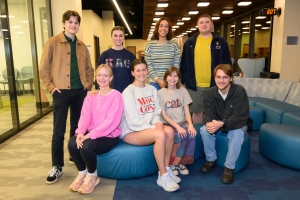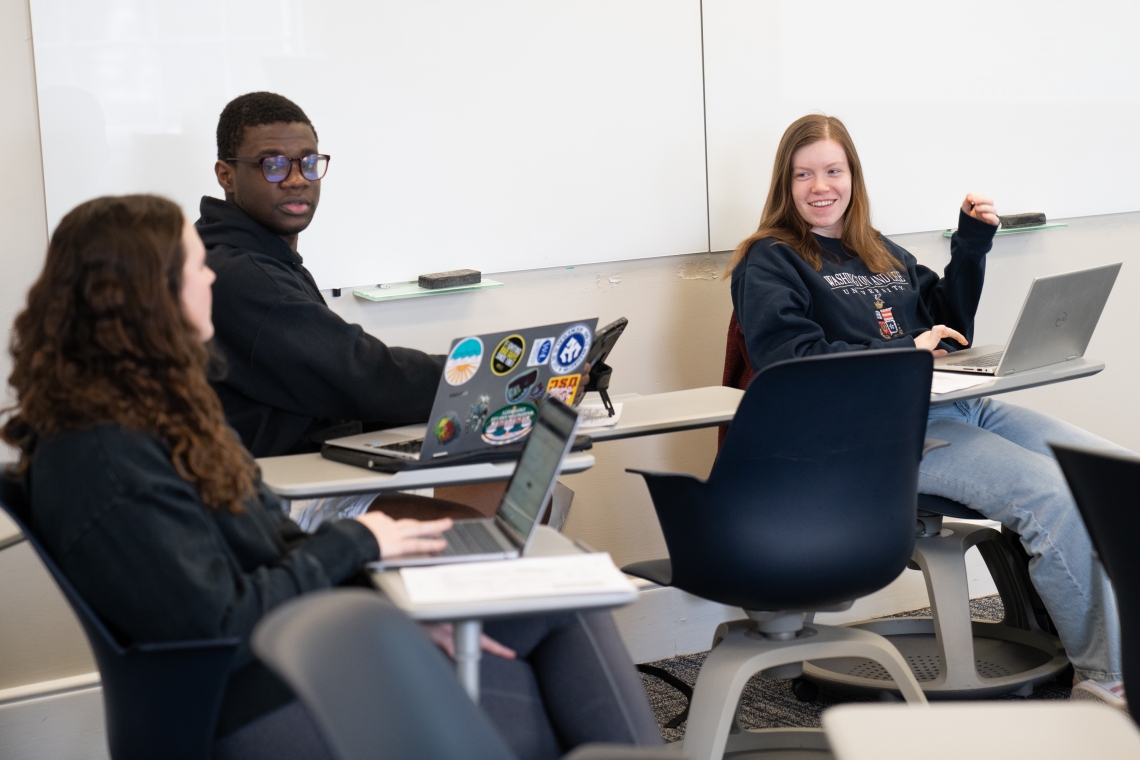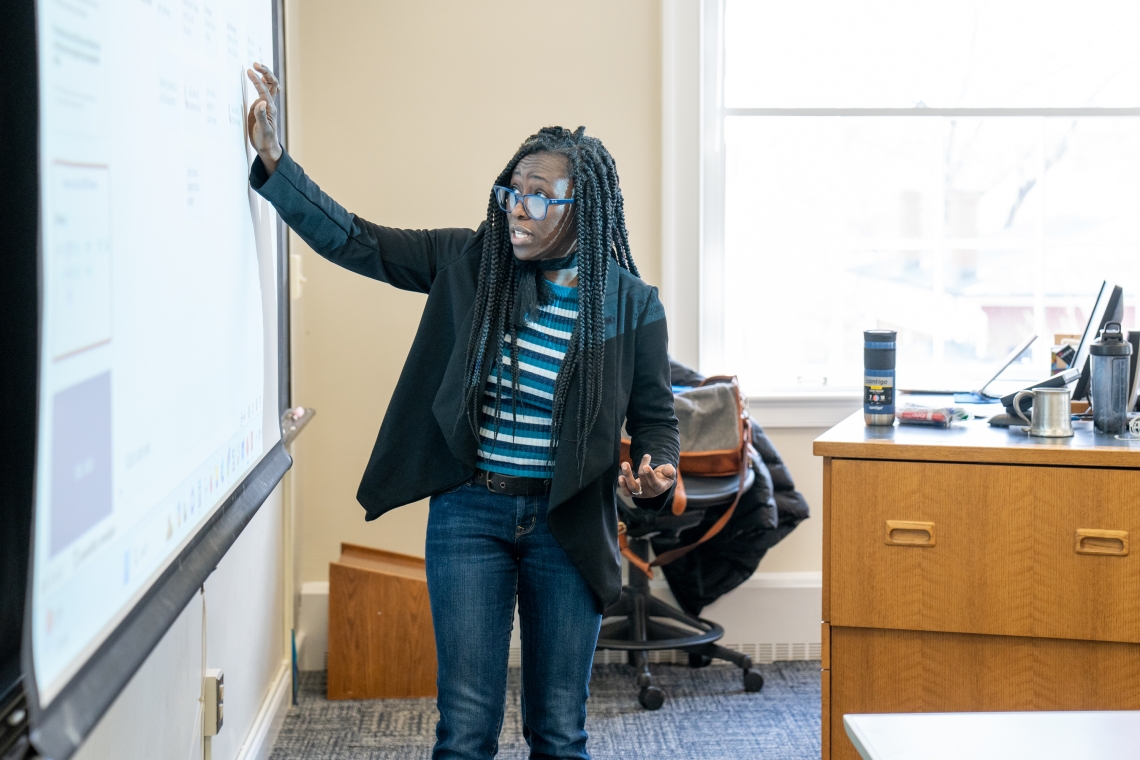
VITA Program Returns Washington and Lee students are applying their accounting skills in the community as part of the Volunteer Income Tax Assistance program.
“VITA not only provides real-world experiential learning for the participating students, but also a sense of accomplishment and the satisfaction that the single act of preparing a tax return for a taxpayer made a positive and tremendous impact in that taxpayer’s life.”
~ Iguehi Rajsky, assistant professor of accounting
Winter Term at Washington and Lee is always a busy time for students balancing academics with campus involvement and events as students look forward to spring’s return to the Shenandoah Valley. Students in Assistant Professor of Accounting Iguehi Rajsky’s Accounting 452 course are working with an additional countdown in mind – the April 15 deadline for filing taxes.
Rajsky’s course is affiliated with the Volunteer Income Tax Assistance (VITA) program, an initiative by the Internal Revenue Service (IRS) that provides free tax preparation services to individuals and families with low to moderate income, individuals with disabilities and limited English-speaking taxpayers. The program aims to help eligible taxpayers — generally those who earn $58,000 or less per year — navigate the tax preparation process and ensure they receive all the tax credits and deductions to which they are entitled. VITA helps taxpayers claim valuable tax credits and deductions, such as the Earned Income Tax Credit (EITC) and Child Tax Credit, which can significantly impact individuals’ refunds. VITA volunteers are equipped to electronically file tax returns, facilitating faster processing and quicker receipt of any potential tax refunds. The class is a designated course within the Office of Community-Based Learning.
Undergraduate accounting students at W&L have been a part of the VITA program for several years; in prior years the program was coordinated through the Tax Clinic at W&L’s Law School. The VITA program utilizes trained and certified volunteers, often accounting students like those in Rajsky’s course, to assist in preparing basic tax returns. VITA program volunteer tax preparers must complete certification training, including over-the-phone interpreter requirements and advanced certification, to prepare tax returns accurately. Participating students must also take and pass Accounting 358, a prerequisite course in which they spend an entire semester learning about several tax regulations pertaining to the individual taxpayer, with a grade of B or higher to enroll in the VITA class.
Those interested in participating in the program will have the opportunity to meet with students in person on Fridays from 2:45-5:15 p.m. and Saturdays from 11 a.m.-1:30 p.m. beginning Feb. 16-17 and continuing March 8 through April 6 (the site is closed for Washington Break) on the main floor of Leyburn Library. The group will also be collaborating with Get Your Refund, an organization that provides remote access to taxpayers around the state, allowing them to upload documents and even schedule video meetings with student tax preparers; students also received training on how to use the virtual platform as part of their VITA preparation.
VITA sites are typically located in community centers, libraries, schools and other convenient locations to make dropping off forms more accessible to those who need assistance. This year, clients from the Rockbridge area can pick up and drop off forms in Leyburn Library. Student volunteer tax preparers conduct comprehensive intake interviews with clients, review documents and provide them with a summary of the process to ensure accurate tax returns are prepared and signed off on by clients.
Last year, VITA students prepared 43 tax returns. John Adekola ’24, an accounting and computer science double major from Chicago, participated in the program last year and said he looked forward to continuing to serve clients in this year’s VITA cohort.
“The desire to help more people, particularly senior citizens who make up a significant portion of our clients, was my main motivation,” said Adekola. “Additionally, enhancing my communication skills has been a rewarding aspect of the experience.”
The program also provides services in multiple languages to assist taxpayers with limited English proficiency. At Washington and Lee, that assistance is provided through ESOL. Jayne Reino, visiting assistant professor of Spanish and adviser to the group, says the organization’s student translations team has set up a fruitful collaboration with this and other community-facing organizations on campus, such as the law school’s tax and immigration rights clinics. Joanna Guevara ’26, an economics major with a minor in poverty and human capability studies from Jefferson, Wisconsin, who serves as ESOL’s translation co-chair, oversees and manages the distribution of document requests from ESOL’s community partners to the translations team. ESOL primarily supports the clients of the VITA program through translations from English to Spanish.
“The tax forms we translate are essential in reducing any disparity in understanding for non-English speaking clients,” Guevara said. “ESOL’s translations have consisted of tax form sections and flyers advertising the services of the VITA program. The translation of the tax form is meant for clients to familiarize themselves with documents of importance and make the process of taxes more manageable.”
Guevara said it is important for VITA clients to understand the process of completing their taxes, and ESOL works diligently to eliminate barriers related to language.
“This is a delicate process as it is,” Guevara said, “and being unfamiliar may lead to unnecessary stress that overwhelms our community members. The VITA program outlines the rights and responsibilities of being a U.S. taxpayer, and ESOL serves as a mechanism in facilitating communication with all community members. Our translations team is proud to form this partnership with the VITA program in further carrying out a common goal.”
Rajsky said that the collaboration has been integral to extending her students’ reach in the community.
“VITA not only provides real-world experiential learning for the participating students, but also a sense of accomplishment and the satisfaction that the single act of preparing a tax return for a taxpayer made a positive and tremendous impact in that taxpayer’s life,” Rajsky said. “Thanks to the ESOL team, the impact that the VITA accounting students make will extend to the Spanish-speaking community, which would otherwise have a difficult time finding help with tax preparation in Rockbridge. These students are doing an amazing job with narrowing the opportunity gap, and they are an asset to our W&L community and Rockbridge at large.”
For questions about the VITA program, contact VITA@wlu.edu.
 Students in Accounting 452 engage in weekly class discussions.
Students in Accounting 452 engage in weekly class discussions. Iguehi Rajsky, assistant professor of accounting, helps students prepare to meet with VITA clients.
Iguehi Rajsky, assistant professor of accounting, helps students prepare to meet with VITA clients.
You must be logged in to post a comment.